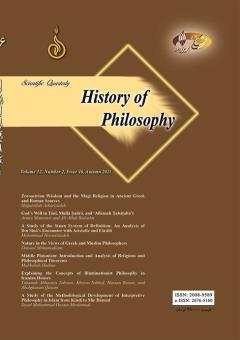Zoroastrian Wisdom and the Magi Religion in Ancient Greek and Roman Sources
Subject Areas : Geneology of philosophical schools and Ideas
1 - PhD in Philosophy, Lecturer at Payame Noor University, Larestan Branch, Fars, Iran
Keywords: Zoroaster, Magi, Wisdom, magic, philosophy,
Abstract :
The impact of Zoroastrian religion and worldview on Greek philosophy, ancient philosophers, and generally on history of philosophy as a fundamental topic regarding the historical development of philosophy has always been of interest to researchers. Ancient thinkers have always spoken of Zoroastrian wisdom and philosophy and connected them to the Magi religion. The present paper examines Zoroastrian philosophy and its origin in the Magi religion based on ancient Greek and Roman sources. Based on such sources, the founder of this school of philosophy is a Zoroastrian who is much older than Zoroaster, the author of Avesta, who lived in the time of Goštāsp. Therefore, if we wish to study Zoroastrian wisdom and philosophy from the viewpoint of ancient Greek and Roman thinkers, we must seek its roots in the Magi religion; a religion that is apparently one of the oldest philosophical schools of ancient times and first appeared in Iran.
ابنمنظور، محمد بن مکرم (1414 ق) لسان العرب، تحقيق جمالالدین میردامادی، بیروت: دار صادر.
ارسطو (1378) سماع طبيعی (فيزيک)، ترجمه محمدحسن لطفي، تهران: طرح نو.
اسدی طوسی، ابومنصور علی بن احمد (1319) کتاب لغت فرس، تصحیح عباس اقبال، تهران: چاپخانه مجلس.
بیرونی، ابوریحان (1390) آثار الباقیه عن القرون الخالیه، تصحيح عزیزالله علیزاده، تهران: فردوس.
بیرونی، ابوریحان (2002م) القانون المسعودی، تحقيق عبدالكريم سامي الجندي، بیروت: دارالکتب العلمیة.
حسینی زبیدی، محمدمرتضی (1414ق) تاج العروس من جواهر القاموس، تصحيح علی هلالی و علی سیری، بیروت: دارالفکر.
دهخدا، علياكبر (1377) لغتنامه، تهران: دانشگاه تهران.
شهرزوری، محمد بن محمود (1372) شرح حکمة الإشراق، تحقيق حسين ضیایی، تهران: پژوهشگاه علوم انسانی و مطالعات فرهنگى.
شهرستانی، محمد بن عبدالکریم (1364) الملل و النحل، قم: الشریف الرضی.
فاضل مقداد (1422ق) اللوامع الإلهية فی المباحث الكلامية، قم: دفتر تبلیغات اسلامی.
فراهیدی، خلیل بن احمد (1409ق) کتاب العین، قم: هجرت.
کاپلستون، فردریک چارلز (1393) تاریخ فلسفه، ج2، ترجمة ابراهیم دادجو، تهران: علمي و فرهنگي.
یاقوت حموی (1995م) المعجم البلدان، بیروت: دار صادر.
Herodotus (1890). The Histories. trans. by G. C. Macaulay. London: Macmillan.
Diogenes Laertius (1925). Lives of the Eminent Philosophers. trans. by R. D. Hicks. Cambridge: Harvard University Press.
Pliny, A. (the Elder) (1855). The Natural History. trans. by H. T. Riley & J. Bostock. H. G. Bohn (Publisher).
Plutarch of Chaeronea (1878a). Isis and Osiris, or of the ancient religion and philosophy of Egypt. The Moralia. ed. by W. Watson Goodwin. https://topostext.org.
Plutarch of Chaeronea (1878b). Concerning the procreation of the soul as Discoursed In Timaeus. The Moralia. ed. by W. Watson Goodwin. https://topostext.org.
Justin (1876). History of the World. trans. by J. S. Watson. https://tertullian.org
Eusebius (2008). Chronography. trans. by A. Smith. https://archive.org.
Jerome (2005). The Chronicon or Chronicle, translated and formatted by Roger Pearse. https://tertullian.org
Hippolytus (1921). Philosophumena or the refutation of all heresies. trans. from the text of cruice by F. Legge. New York: Macmillan.


